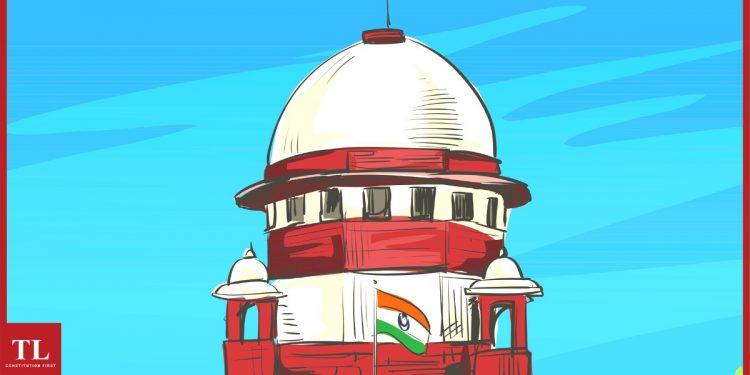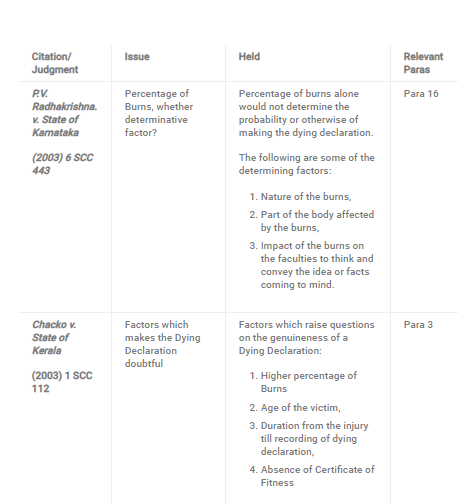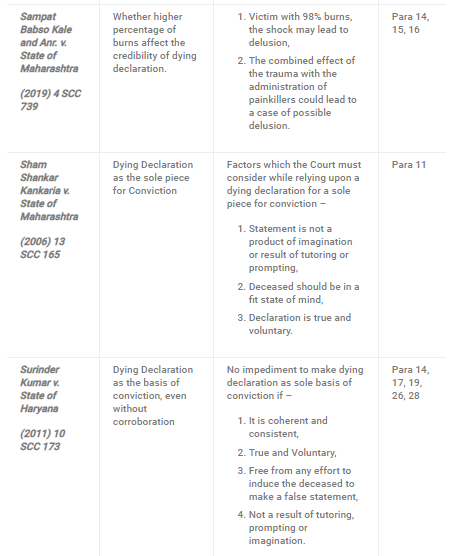Supreme Court Clarifies Law on Dying Declaration

Supreme Court of India.
A three judge bench of the Supreme Court in the recent judgment of ‘Jayamma & Anr. v/s. State of Karnataka’, discussed in detail, the significance of a Dying Declaration as the solitary piece of evidence in a murder trial.
The Court was adjudicating an appeal against an order of reversal of acquittal by the High Court of Karnataka. The basis of reversal of acquittal was the dying declaration of the victim, corroborated by the statement of the police officer and the doctor, in whose presence it was recorded.
The Supreme Court, while reversing the order of the High Court, disbelieved the dying declaration on the grounds that :
- The narration of events in the dying declaration were too accurate to be believed to be true.
- The deceased was an illiterate person, and it appeared beyond human probabilities to narrate the details of the incident with such a high degree of accuracy.
- The possibility of the victim not fit to give any statement owing to 80% burn injuries could not be ruled out, and the conduct of the police officer was also held to be doubtful.
- Contradictions in the statements of the police officer and the doctor with respect to the nature of injuries.
- No endorsement of ‘Fit State of Mind’ before recording the dying declaration.
- Motive of ‘Homicidal Death’ was doubtful.
- Unusual conduct of relatives of not registering a complaint, which supported the alternate theory that the victim might have committed suicide.
- Prosecution had sufficient time to call for the assistance of a Judicial Magistrate to record the dying declaration, however, it failed to do so.
The judgment in Jayamma as referred to above is a significant one, since it clarifies the evidentiary value of a dying declaration, and the sustenance of conviction solely based thereupon. The Court held as follows –
- On Dying Declaration being the solitary piece of evidence:
“When the dying declaration has been recorded in accordance with law, and it gives a cogent and plausible explanation of the occurrence, the Court can rely upon it as the solitary piece of evidence to convict the accused.”
- The Object of Section 32 of the Indian Evidence Act and admissibility of Dying Declaration:
“It is for this reason that Section 32 of the Evidence Act, 1872 is an exception to the general rule against the admissibility of hearsay evidence and its Clause (1) makes the statement of the decease admissible. Such statement, classified as a “dying declaration” is made by a person as to the cause of his death or as to the injuries which culminated to his death or the circumstances under which injuries were inflicted. A dying declaration is thus admitted in evidence on the premise that the anticipation of brewing death breeds the same human feelings as that of a conscientious and guiltless person under oath. It is a statement comprising of last words of a person before his death which are presumed to be truthful, and not infected by any motive or malice. The dying declaration is therefore admissible in evidence on the principle of necessity as there is very little hope of survival of the maker, and if found reliable, it can certainly form the basis for conviction.”
Landmark Judgments relied upon by the Court:


(Prastut Dalvi is an advocate in the Supreme Court. The views expressed are personal.)
The article was originally published in The Leaflet.
Get the latest reports & analysis with people's perspective on Protests, movements & deep analytical videos, discussions of the current affairs in your Telegram app. Subscribe to NewsClick's Telegram channel & get Real-Time updates on stories, as they get published on our website.























